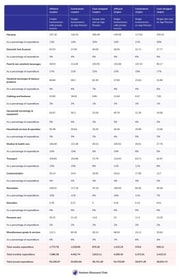
Australia's biggest bank is once again in hot water for lending money to someone whose spending patterns screamed 'gambling problem.'
But this isn't just another isolated incident—it's part of a concerning pattern that raises serious questions about whether our major banks are truly protecting vulnerable customers or simply chasing profits.
The latest case involves a man who spent 57 per cent of his income gambling with bookmakers, yet Commonwealth Bank still approved him for not one, but two personal loans totalling more than $13,000. His story, now before the Australian Financial Complaints Authority (AFCA), shines a spotlight on an issue that affects hundreds of thousands of Australian families.
In this Article
A Gambling Problem in Plain Sight
The unnamed customer's bank statements told a clear story. In the 90 days leading up to his September 2024 loan application, he had spent $8,251 on bookmakers—mainly horse racing—while earning just $14,510. That's more than half his take-home pay disappearing into gambling.
Most people would see this as a red flag the size of the Melbourne Cup. But CBA's automated systems gave it the green light, approving a $6,812 personal loan. When the man applied for a second loan worth $6,727 in March to consolidate his debts, the bank said yes again.
'My gambling was out of control and if you looked at my transactions it was obvious,' the man told the ABC. 'Instead of stopping to ask if I was OK, they approved not one but two loans.'
'My gambling was out of control and if you looked at my transactions it was obvious. Instead of stopping to ask if I was OK, they approved not one but two loans.'
The $10,000 Loophole
Here's where it gets particularly troubling. CBA's internal policy only declines credit for people who have spent more than $10,000 on gambling in the 90 days before their application.
Since this customer 'only' spent $8,251, he fell just under the threshold.
Think about that for a moment. A person spending over half their income on gambling is somehow considered an acceptable lending risk because they didn't quite hit an arbitrary $10,000 limit. For someone earning minimum wage, that threshold would represent nearly their entire income for three months.
Martin Thomas, chief executive of the Alliance for Gambling Reform, called the bank's approach 'extraordinary,' noting that it failed to take into account the varying incomes and financial circumstances of customers.
Understanding CBA's Gambling Policy
Someone earning $20,000 annually could spend 45% of their income gambling and still qualify for loans
The policy doesn't consider gambling as a percentage of income
It treats a millionaire's $9,999 gambling spend the same as a pensioner's
A Pattern of Poor Judgement
This isn't CBA's first rodeo with problem gamblers. In 2020, the Federal Court ordered CBA to pay a penalty of $150,000 for contraventions of the responsible lending provisions under the National Consumer Credit Protection Act.
That case involved David Harris, who had specifically told the bank he was a problem gambler and didn't want his credit limit increased until he got his gambling under control.
What did CBA do? They increased Mr Harris' credit limit from $27,100 to $35,100 just three months after he notified a staff member about his gambling problem.
'I tried to reach out for help and I couldn't get any, I got the opposite, I got credit limit increases sent through and I tried to tell them I had a problem,' Mr Harris said during the hearing.
The current case's family representative said it showed CBA had learned nothing from that earlier matter. 'They're back to their old tricks,' he said. 'They need to do more to protect vulnerable people.'
The Scope of Australia's Gambling Problem
To understand why this matters so much, you need to grasp the scale of gambling in Australia. Recent data shows that three in four Australians aged 18 and over had gambled in the past year as of 2022, with almost half (46%) of those who gambled classified as being at some risk of gambling harm.
The average Australian adult loses about $1,527 to gambling every year—money that could be going towards mortgage repayments, retirement savings, or helping the grandkids with their education.
While younger demographics are often in the spotlight for online sports betting, gambling problems affect Australians across all age groups. For many seniors, the local RSL or club pokies can become a dangerous trap, especially during periods of social isolation or financial stress.
Did you know?
Did You Know? Australia has one of the world's highest rates of gambling participation and losses. We have approximately 200,000 poker machines operating across the country—that's about 20% of all poker machines globally, despite having just 0.3% of the world's population.
New Protections, But Are They Enough?
The banking industry and government have introduced some new protections in recent years. From 11 June 2024, interactive gambling providers are prohibited from accepting payments using a credit card, payments linked to a credit card (including digital wallets) or payments using digital currency.
CBA and other major banks now offer gambling blocks that customers can activate on their cards. However, these rely on customers recognising they have a problem and taking action—something that may not happen until significant damage is already done.
The current case highlights a more fundamental issue: banks have access to detailed spending data that could identify problem gambling patterns, but they're not using it proactively to protect customers.
Your Rights When Banks Get It Wrong
If you believe a bank has acted irresponsibly in lending to you or a family member, you have options. The Australian Financial Complaints Authority (AFCA) provides free, independent dispute resolution for financial complaints.
AFCA received more than 100,000 financial complaints in 2024-25, showing that many Australians are willing to challenge financial institutions when things go wrong.
The process is straightforward:
Steps to File a Complaint
- First, complain directly to your bank or financial institution
- If unsatisfied, escalate your complaint to AFCA
- AFCA can order compensation and remedies
- From 1 January 2024, AFCA can award compensation up to $6,300 per claim
The Human Cost Behind the Numbers
Beyond the policy debates and statistics, there's a human story here. The man at the centre of this case described the impact: 'The stress was constant. I wasn't sleeping.' He's since begun treatment for his gambling addiction, but the financial damage from the loans remains.
His family is seeking $25,000 in compensation to cover the debt, interest, and harm caused. CBA has offered just $2,603—a figure that seems almost insulting given their admission that they identified his gambling spending when he applied for the first loan.
This highlights a broader question about corporate responsibility. Should banks that profit from customers' financial distress bear more responsibility when their lending decisions make problems worse?
Warning Signs Banks Should Watch For
Financial institutions have sophisticated systems that can track spending patterns across thousands of transactions. Here are some red flags that should trigger additional scrutiny before approving loans:
Gambling Red Flags for Lenders
Gambling expenditure exceeding 20% of net income
Frequent small deposits followed by immediate withdrawals
Multiple gambling-related transactions across different platforms
Payday loan usage combined with gambling spending
Declining account balances with consistent gambling outflows
Support When You Need It
If you or someone you know is struggling with gambling, help is available:
Key Support Services
- Gambling Help: 1800 858 858 (24/7 support)
- National Debt Helpline: 1800 007 007 (free financial counselling)
- Lifeline: 13 11 14 (crisis support)
What This Means for Bank Customers
The Commonwealth Bank case raises important questions for all banking customers:
Key Takeaways for Customers
- Scrutinise your loan applications—banks may not assess risks thoroughly
- Know your rights—AFCA provides free dispute resolution
- Monitor family finances—problem gambling leaves clear spending patterns
- Use available tools—gambling blocks and spending alerts can help
The Road Ahead
As this case works its way through AFCA's processes, it serves as a reminder that Australia's major banks still have work to do in protecting vulnerable customers. While new regulations around credit card gambling have tightened some loopholes, the fundamental issue remains: banks have the data to identify problem gambling patterns but aren't consistently using it to prevent harm.
The Australian Securities and Investments Commission is reportedly looking into this matter, which could lead to further regulatory changes. For now, it's up to customers and their families to stay vigilant and use the complaint mechanisms available when banks fail in their duty of care.
The man's case is still being resolved, but his situation has already highlighted a system that prioritises profit over protection. As he put it: 'Banks need to act on the warning signs they can see in their own systems, because when they ignore them, people like me pay the price.'
What This Means For You
The case against Commonwealth Bank highlights how banks still approve loans for people with clear gambling problems, despite obvious warning signs.
CBA’s policy only blocks applications after $10,000 is spent on gambling in 90 days, overlooking the damage smaller amounts can cause for those on modest incomes.
For older Australians living on pensions or super, gambling risks at clubs or pokies can quickly unravel financial security, especially during times of loneliness or stress.
Until banks take stronger action, retirees need to stay vigilant, use tools like gambling blocks, and know their rights through AFCA to challenge irresponsible lending.
What are your thoughts on banks' responsibility to protect customers from their own spending habits?
Have you or someone you know had similar experiences with lending decisions that seemed to ignore obvious warning signs? Share your experiences and views in the comments below.







